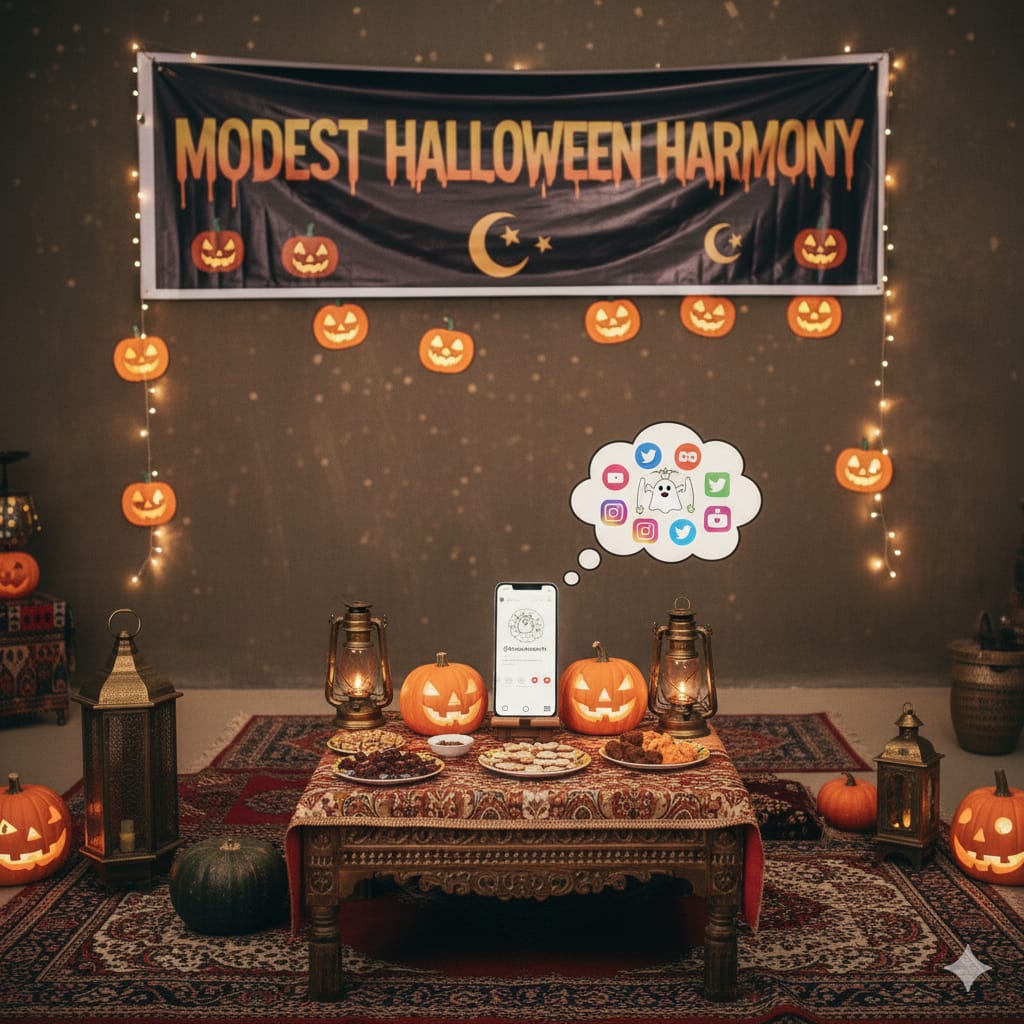From InstaCulture to Islamic Ethics: Cultural Hybridization and Halloween Celebrations in Pakistani Society
Abstract
 Abstract Views: 0
Abstract Views: 0
The current study aimed to explore how Halloween, a Western cultural celebration, is represented on Instagram. Furthermore, the study identified how Pakistani youth engage with or resist such content in light of their religious values. Data was collected in Lahore from 16 participants across four categories: youth, young professionals, parents/educators, and religious scholars. Guided by Agenda-setting and Uses and Gratifications Theories (UGT), the analysis identified six themes. These included representation of Halloween on Instagram, cultural influence via social media, media engagement and user motivation, content creation and sharing behaviour, negotiation between faith and trends, and cultural hybridization and identity. The findings revealed that Instagram frames Halloween as a visually-appealing and secular lifestyle trend, contributing to its normalization in Muslim digital spaces. Youth often interact with such content for entertainment and social belonging. On the other hand, others adopt selective exposure strategies to align with Islamic values. Parents and educators emphasize cultural preservation and moral safeguarding, whereas religious scholars caution against Westernization and the erosion of religious identity. Participants navigated these tensions by reframing their engagement as cultural rather than religious. The study concluded that Pakistani youth are not passive consumers of global media but active negotiators of cultural and religious boundaries. By blending digital trends with faith-based values, they construct hybrid identities that merge Instagram culture with Islamic ethics. This study offered empirical evidence on how Pakistani youth selectively adapt Western cultural trends within an Islamic ethical framework. Additionally, the study contributed to discussions on digital literacy, cultural sensitivity, and the negotiation of global media.
Downloads
References
Ahmad, Maiss., and Stephen Wilkins. “Purposive Sampling in Qualitative Research: A Framework for the Entire Journey.” Quality & Quantity 59 (2025):1461–479, https://doi.org/10.1007/s11135-024-02022-5.
Akhter, Naseem., Aftab Ahmad, and Laila Zubairi. “Social Media as Mirror and Mediator: Analysing Intra-Faith Dynamics among Youth in Peshawar, Pakistan within an Islamic Framework.” Advance Social Science Archive Journal (ASSAJ) 3, no. 02 (2025): 1355-1365, https://www.assajournal.com/index.php/36/article/view/427.
Alhabash, Saleem., Duygu Kanver, Chen Lou, Sandi W. Smith, and Pang-Ning Tan. “Trick or Drink: Offline and Social Media Hierarchical Normative Influences on Halloween Celebration Drinking.”Health communication 36, no. 14 (2021): 1942–1948, https://doi.org/10.1080/10410236.2020.1808406.
Braun, Virginia., and Victoria Clarke. “Reporting guidelines for Qualitative Research: A Values-Based Approach.” Qualitative Research in Psychology 22, no. 2 (2025): 399–438, https://doi.org/10.1080/14780887.2024.2382244.
DeFleur, Melvin L., and Margaret H. DeFleur. “Agenda-Setting Theory.” In Mass Communication Theories: Explaining Origins, Processes, and Effects, edited by Melvin L. DeFleur and Margaret H. DeFleur, 181–193. New York: Routledge, 2016, https://doi.org/10.4324/9781315663593.
Dobrin, Diana. “The Hashtag in Digital Activism: A Cultural Revolution.” Journal of Cultural Analysis and Social Change 5, no. 1 (2020): 1–14, https://doi.org/10.20897/jcasc/8298.
Geampana, Alina., and Manuela Perrotta. “Using Interview Excerpts to Facilitate Focus Group Discussion.” Qualitative Research 25, no. 1 (2025): 130-146, https://doi.org/10.1177/146879412412342.
Gilardi, Fabrizio., Theresa Gessler, Maël Kubli, and Stefan Müller. “Social Media and Political Agenda Setting.” Political Communication 39, no. 1 (2022): 39–60, https://doi.org/10.1080/10584609.2021.1910390.
Hutton, Ronald. “The Celtic New Year and Feast of the Dead.” Folklore 135, no. 1 (2024): 69–86, https://doi.org/10.1080/0015587X.2023.2282282.
Katz, Elihu., Jay G. Blumler, and Michael Gurevitch. “Uses and Gratifications Research.” The Public Opinion Quarterly 37, no. 4 (1973): 509–523, https://www.jstor.org/stable/2747854.
Kerim, Shamshadin., Maxat Kurmanaliyev, and Yershat Ongarov. “Social Networks as a Tool for Islamic Preaching.” Journal of Islamic Thought and Civilization 15, no. 1 (2025): 44–58, https://doi.org/10.32350/jitc.151.03.
Lisa Morton. Trick or Treat: A History of Halloween. London: Reaktion Books, 2012.
Mishnick, Nicole., and Dana Wise. “Social Media Engagement: An Analysis of the Impact of Social Media Campaigns on Facebook, Instagram, and LinkedIn.” International Journal of Technology in Education 7, no. 3 (2024): 535–549, https://doi.org/10.46328/ijte.699.
Mohyeddin, Zia. “Cultural identity in a Globalized World: Navigating Tradition and Modernity.” Frontiers in Humanities and Social Research 1, no. 3 (2024): 106-115, https://doi.org/10.71465/fhsr202.
Mokhtar, Aida., and Che Amnah Bahari. “Social Media and Islamic Ethics: An Insight to Instagram use by Muslim University Students in Malaysia.” Intellectual Discourse 29, no. 1 (2021): 175–206, https://doi.org/10.31436/id.v29i1.1764.
Pei, Zhang., Jusang Bolong, Tham Jen Sern, and Mohd Nizam Osman. “Gratification Needs Factors for Authentic Self-Expression on Instagram.” International Journal of Academic Research in Business and Social Sciences 14, no. 12 (2024): 703–718, http://dx.doi.org/10.6007/IJARBSS/v14-i12/24018.
Safdar, Ghulam. “Cultural Aspiration across the Borders: Measuring the Cultural Effects of Online Media on Pakistani Youth.” Online Media and Society 2 (2021): 41–50, https://doi.org/10.71016/oms/v1bp0k28.
Santino, Jack. “Halloween in America: Contemporary Customs and Performances.” Western Folklore 42, no. 1 (1983): 1–20, https://doi.org/10.2307/1499461.
Shodiqoh, Rozanatush. "Digital ethics: Social media ethics in a contemporary Islamic perspective." Solo International Collaboration and Publication of Social Sciences and Humanities 2, no. 3 (2024): 215–226, https://doi.org/10.61455/sicopus.v2i03.153.
Subedi, Khim Raj. “Safeguarding Participants: Using Pseudonyms for Ensuring Confidentiality and Anonymity in Qualitative Research.” KMC Journal 7, no. 1 (2025): 1–20, https://doi.org/10.3126/kmcj.v7i1.75109.
Tandon, Anushree., Amandeep Dhir, Intesar Almugren, Ghada Naif AlNemer, and Matti Mäntymäki. “Fear of Missing out (FoMO) among Social Media Users: a Systematic Literature Review, Synthesis and Framework for Future Research.” Internet Research 31, no. 3 (2021): 782–821, https://doi.org/10.1108/INTR-11-2019-0455.
Wibowo, Arif Ardy. “Publication trends related to Uses and Gratification Theory on Social Media.” International Journal of Communication and Society 4, no. 2 (2022): 258–266, https://doi.org/10.31763/ijcs.v4i2.789.
Yolanda, Agnita., Ria Wuri Andary, Ilma Saakinah Tamsil, Khalil Zaman, and Sun Wei. “The Role of Social Media in the Formation of Global Cultural Identity.” Journal of Social Science Utilizing Technology 3, no. 1 (2025): 10–18, https://doi.org/10.70177/jssut.v3i1.2102.

Copyright (c) 2025 Saima Waheed, Mohd. Khairie Ahmad, Zafar Iqbal Bhatti

This work is licensed under a Creative Commons Attribution 4.0 International License.

This work is licensed under a Creative Commons Attribution 4.0 International License. Authors retain copyright and grant the journal right of first publication with the work simultaneously licensed under a Creative Commons Attribution (CC-BY) 4.0 License that allows others to share the work with an acknowledgement of the work’s authorship and initial publication in this journal.







